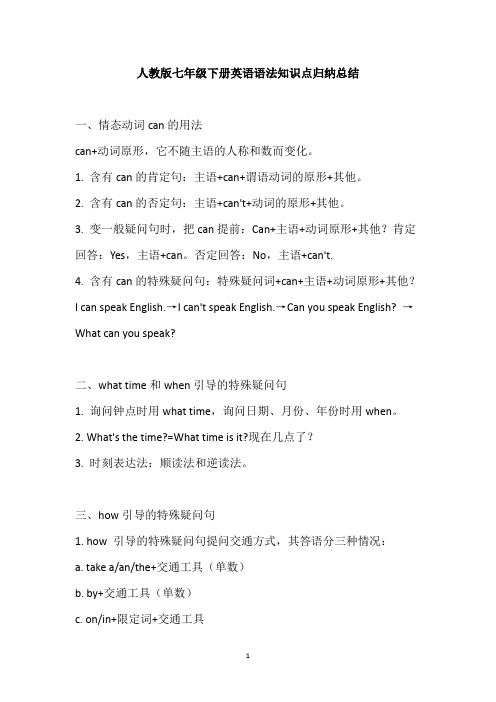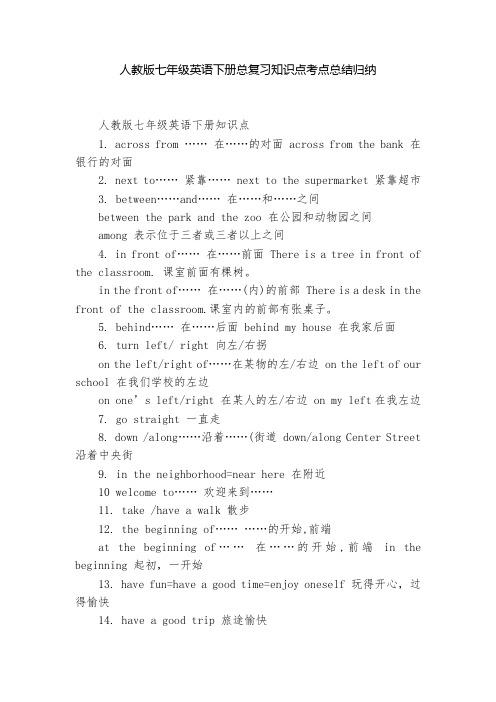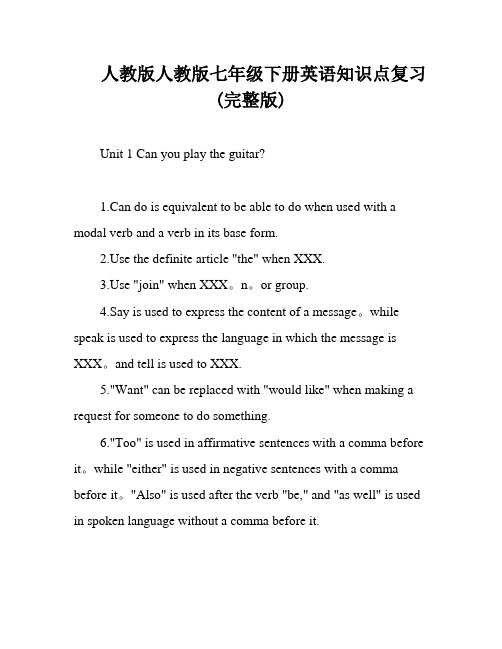人教版七年级下册英语总复习资料知识讲解
人教版七年级下册英语语法知识点归纳总结

人教版七年级下册英语语法知识点归纳总结一、情态动词can的用法can+动词原形,它不随主语的人称和数而变化。
1. 含有can的肯定句:主语+can+谓语动词的原形+其他。
2. 含有can的否定句:主语+can't+动词的原形+其他。
3. 变一般疑问句时,把can提前:Can+主语+动词原形+其他?肯定回答:Yes,主语+can。
否定回答:No,主语+can't.4. 含有can的特殊疑问句:特殊疑问词+can+主语+动词原形+其他?I can speak English.→I can't speak English.→Can you speak English? →What can you speak?二、what time和when引导的特殊疑问句1. 询问钟点时用what time,询问日期、月份、年份时用when。
2. What's the time?=What time is it?现在几点了?3. 时刻表达法:顺读法和逆读法。
三、how引导的特殊疑问句1. how 引导的特殊疑问句提问交通方式,其答语分三种情况:a. take a/an/the+交通工具(单数)b. by+交通工具(单数)c. on/in+限定词+交通工具---How do you go to school every day?---I take a bus to go to school every day./I go to school by bus every day./I go to school on the bus every day.2. how far 用来提问距离,多远,其答语分为两种:(1)用长度单位表示:It is five kilometers.(2)用时间表示:It’s twenty minutes’walk.3. how long 用来提问时间,意为多久回答常用“for+段时”。
人教版七年级下册英语期末复习Unit1-Unit12课本语法知识点提纲(全面!)

人教版七年级下册英语期末复习Unit1-Unit12课本语法知识点提纲七年级下册Unit1一、重点词组与句子Section A1.下象棋play chess2.弹吉他Play the guitar3.说英语/汉语/日语speak English/Chinese/Japanese4.参加艺术俱乐部join the art club5.音乐/游泳俱乐部music/swimming club6.学校文艺表演school show7.跟....说talk to/with8.打/表演中国功夫do Chinese kungfu9.想要做want to do sth10.擅长......be good at sth/doing sth1.Can you draw? 你会画画吗?2.I want to join the art club.我想要参加美术社团。
3.You are very good at telling stories 你很擅长讲故事。
4.Then join two clubs,the story telling club and the art club!那就参加两个社团,讲故事社团和美术社团!5.What club do you want to join?你想参加什么社团?6.I want to join the chess club.我想要参加国际象棋社团。
7.Can you and Tom play chess? 你和汤姆会下国际象棋吗?8.Students wanted for school show学校文艺表演招募学生。
9.We want students for the school show. 我们学校表演需要学生。
10.Please talk to Mr Zhang after school. 请放学后跟张老师说。
11.What can you do? 你会做什么?e and show us! 老战士给我们看看吧!Section B1.弹钢琴/拉小提琴play the piano/violin2.打鼓play the drums3.题足球/打篮球play football/basketball4.唱歌跳舞sing and dance5.养老院the old people’s home6.善于和....相处be good with7.交朋友make friends8.打...电话找某人call sb at9.在...方面帮忙help with10.在周末on the weekend/on weekends3.I like to play basketball. 我喜欢打篮球。
人教版七年级下册英语各单元知识点归纳

人教版七年级下册英语各单元知识点归纳七年级下册的英语学习是英语基础巩固和提升的重要阶段,以下是对各单元知识点的详细归纳。
Unit 1 Can you play the guitar?一、重点词汇1、 guitar 吉他2、 sing 唱歌3、 swim 游泳4、 dance 跳舞5、 draw 画画6、 chess 国际象棋7、 play chess 下国际象棋8、 speak 说(某种语言);说话9、 speak English 说英语10、 join 参加;加入11、 club 俱乐部;社团12、be good at… 擅长于……13、 tell 讲述;告诉14、 story 故事;小说15、 write 写作;写字16、 show 演出;节目;给……看;展示17、 or 或者;也不(用于否定句)18、 talk 说话;交谈19、talk to… 跟……说20、 kung fu (中国)功夫二、重点句型1、—Can you swim? 你会游泳吗?—Yes, I can / No, I can't 是的,我会。
/不,我不会。
2、—What club do you want to join? 你想加入什么俱乐部?—I want to join the chess club 我想加入国际象棋俱乐部。
3、 You're very good at telling stories 你非常擅长讲故事。
4、 Please talk to Mr Zhang after school 放学后请和张先生谈谈。
三、语法点1、情态动词 can 的用法can 表示能力,意为“能;会”,其后接动词原形。
否定形式为can't ,意为“不能;不会”。
2、动词短语常见的动词短语如:play chess ,play the guitar ,swim well 等。
Unit 2 What time do you go to school?一、重点词汇1、 up 向上2、 get up 起床;站起3、 dress 穿衣服;连衣裙4、 get dressed 穿上衣服5、 brush 刷;刷净;刷子6、 tooth (pl teeth )牙齿7、 shower 淋浴;淋浴器(间)8、 take a shower 洗淋浴9、 usually 通常地;一般地10、 forty 四十11、 wow (表示惊奇或敬佩)哇;呀12、 never 从不;绝不13、 early 早(的)14、 fifty 五十15、 job 工作;职业16、 work 工作17、 station 电(视)台;车站18、 radio station 广播电台19、 o'clock (表示整点)……点钟20、 night 晚上;夜晚二、重点句型1、—What time do you usually get up? 你通常几点起床?—I usually get up at six thirty 我通常六点半起床。
人教版七年级英语下册总复习知识点考点总结归纳

人教版七年级英语下册总复习知识点考点总结归纳人教版七年级英语下册知识点1. across from ……在……的对面 across from the bank 在银行的对面2. next to……紧靠…… next to the supermarket 紧靠超市3. between……and……在……和……之间between the park and the zoo 在公园和动物园之间among 表示位于三者或三者以上之间4. in front of……在……前面 There is a tree in front of the classroom. 课室前面有棵树。
in the front of……在……(内)的前部 There is a desk in the front of the classroom.课室内的前部有张桌子。
5. behind……在……后面 behind my house 在我家后面6. turn left/ right 向左/右拐on the left/right of……在某物的左/右边 on the left of our school 在我们学校的左边on one’s left/right 在某人的左/右边 on my left在我左边7. go straight 一直走8. down /along……沿着……(街道 down/along Center Street 沿着中央街9. in the neighborhood=near here 在附近10 welcome to……欢迎来到……11. take /have a walk 散步12. the beginning of…………的开始,前端at the beginning of……在……的开始,前端in the beginning 起初,一开始13. have fun=have a good time=enjoy oneself 玩得开心,过得愉快14. have a good trip 旅途愉快15. take a taxi 坐出租车16. 到达:get to +地方get here/ there/ home 到这/那/家 arrive in +大地方 I arrive in Beijing. arrive at +小地方I arrive at the bank. reach +地方17.go across 从物体表面横过 go across the street横过马路go through 从空间穿过 go through the forest穿过树林18.on + 街道的名称。
期末复习人教版英语七年级下册单元重点知识点语法汇总

人教版七年级下册-单元重点语法汇总U1情态动词can的用法can是情态动词,意为“能,会”,表示某人或某物具备的能力,还可用来提出请求,没有人称和数的变化,后面直接接动词原形。
下面学习情态动词can的常见用法。
1.表示“能力”,意为“能,会”。
例句:I can speak English.我会讲英语。
2.表示“请求”或“许可”。
例句:Can you help me with my Chinese?你能帮我学汉语吗?You can go to the park after you finish your homework.你做完作业后可以去公园。
3.含有情态动词can的肯定句变否定句时,需在can后加not,其缩写形式为can’t;变疑问句时,情态动词can直接放在句首,构成一般疑问句。
例句:I can sing English songs.我会唱英文歌。
(肯定句)→I can’t sing English songs.我不会唱英文歌。
(否定句)Yao Ming can play basketball.姚明会打篮球。
→Can Yao Ming play basketball?姚明会打篮球吗?(一般疑问句)4.对Can…问句的回答可以用下面几种形式:对询问能力的问句的回答可以说“Yes,…can.”或“No,…can’t.”,表示对能力的肯定或否定;对表示请求的问句的回答可以说“OK./All right.”,表示同意对方的请求。
也可用certainly或sorry来回答。
用certainly作肯定回答,语气更肯定;用sorry作否定回答,语气则更委婉、客气。
例句:—Can you speak English?你会说英语吗?—Yes,I can.是的,我会。
—Can I see your pencil-box,please?请问,我可以看一下你的铅笔盒吗?—All right./Certainly.Here you are.可以。
人教版人教版七年级下册英语知识点复习(完整版)

人教版人教版七年级下册英语知识点复习(完整版)Unit 1 Can you play the guitar?1.Can do is equivalent to be able to do when used with a modal verb and a verb in its base form.e the definite article "the" when XXX.e "join" when XXX。
n。
or group.4.Say is used to express the content of a message。
while speak is used to express the language in which the message is XXX。
and tell is used to XXX.5."Want" can be replaced with "would like" when making a request for someone to do something.6."Too" is used in affirmative sentences with a comma before it。
while "either" is used in negative sentences with a comma before it。
"Also" is used after the verb "be," and "as well" is used in spoken language without a comma before it.7."Be good at" is used to XXX or activity。
新人教版七年级下册英语各单元知识点总结

新人教版七年级下册英语各单元知识点总结Unit 1 Can you play the guitar?1,情态动词+V 原can do= be able to docan 的用法歌诀can 可用来表力量,但与实动不分别。
不管主语何变换, can 的模样永不变。
只要句中消灭 can,动词原形后面站。
一般疑问 can 提前,否认 can 后not 添。
2, Play+ the+ 乐器 play the violin/piano/drums (乐器前加 the)Play +球类,棋类play football play chess (球类和棋类前省略 the)3,join 参与社团、组织、团体take part in :参与运动、活动 join sb. 参加某人4, 4 个说的区分:say+内容:say it in English 用英语说它speak+语言: speak English 说英语talk 谈论 talk about sth. 谈论某事 talkwith/to sb 和某人交谈tell 告知,表达tell sb. (not)to do sth告知某人(不)去做某事(tell a story)tell stories/ jokes 讲故事/笑话5, want 的用法:想要(动词)(1) want to do sth.= would like to do sth 想要做某事(2) want (sb)to do sth.= would like +(sb)to do sth 想要做某事6, 4 个也的区分: too 确定句末(前面加逗号)either 否认句末(前面加逗号)also 句中,放在实意动词前, be 动词和情态动词之后as well 口语中(前面不加逗号)7, be good at =do well in+ V-ing/N. 擅长于(做)…… be good at playing soccer用法拓展:be good for 对…有益(be bad for 对…有害)be good to 对…友好(good 可用 friendly,nice,kind 替换)be good with 和…相处好=get on/ along well with8,特别疑问句的构成:疑问词+一般疑问句9, How/ what about+V-ing …怎么样?(表建议)What about playing basketball ? 10,感官动词(look, sound, taste, smell, feel)+adj/ like11.选择疑问句:答复不能直接用 Yes 或者 No,要从中选择一个答复Can you play the piano,,the drums,or the guitar? Ican play the drums.你会弹奏钢琴,敲鼓,或者弹吉他吗?我会打鼓12,students wanted for school show 学校演出招募学生(wanted 表示招募,含有被动意义)13,show sth to sb=show sb sth 给某人看某物 show me your book=show your book to me on show,意为“在展出”give sth to sb=give sb sth 给某人某物give me a pen =give a pen to me14,help sb (to)do sth 帮助某人做某事help sb with sth 帮助某人某事with sb’s help= with the help of sb 在某人的帮助下help oneself to 任凭享用15,be busy doing sth= be busy with sth 忙于做某事,be busy doing his homework= be busy with his homework 忙于他的家庭作业116,sb. need to do sth 某人需要做某事 need sb. to do sth 需要某人做某事17,be free= have time 有空的be busy 劳碌的18,make friends 交朋友 make friends with sb.与某人交朋友19,call sb at +电话号码给某人打---电话20,on the weekend= on weekends 在周末21,English-speaking students 说英语的学生(带有连词符,有形容词性质)22,do kung fu 表演功夫23,in, on 和at 在表达时间方面的区分①in+年、月、季节;泛指在上午,下午,晚上,如: inthe morning(afternoon, evening). in spring 在春季in September 在九月②on 指在某一天或某一天的上午,下午,晚上,具体到某一天、节日如: on Monday, on Sunday afternoon, on July 1, 1999 on New Year’s Day③at,一般表示点时间,如 at six o’clock, at three thirty.、习惯用法: at night, at noon,留意:在英语中,假设时间名词前用 this, last, next 等修饰时,像这样的表示,“在某时”的时间短语前,并不需要任何介词。
人教版七年级下册英语知识点复习(完整版)

人教版七年级下册英语知识点复习(完整版) Unit 1 Can you play the guitar?1,情态动词+V原can do= be able to do2,Play+ the+ 乐器+球类,棋类3,join 参加社团、组织、团体4,4个说的区别:say+内容Speak+语言Talk 谈论talk about sth talk with sb talk to sbTell 告诉,讲述tell sb (not)to do sthTell stories/ jokes5,want= would like +(sb)to do sth6,4个也的区别:too 肯定句末(前面加逗号)Either否定句末(前面加逗号)Also 行前be 后As well 口语中(前面不加逗号)7,be good at+ V-ing=do well in 擅长于be good for 对…有益(be bad for对…有害)be good to 对…友好(good 可用friendly,nice,kind替换)be good with和…相处好=get on/ along well with8,特殊疑问句的构成:疑问词+一般疑问句9,How/ what about+V-ing …怎么样?(表建议)10,感官动词(look, sound, taste, smell, feel)+adj/ like11,选择疑问句:回答不能直接用Yes或者No,要从中选择一个回答12,students wanted for school show(wanted表示招募,含有被动意义)13,show sth to sb=show sb sth give sth to sb=give sb sth14,help sb (to)do sthHelp sb with sthWith sb’s help= with the help of sbHelp oneself to 随便享用15,be busy doing sth/ be busy with sth16,need to do sth17,be free= have time18,have friends= make friends19,call sb at +电话号码20,on the weekend= on weekends21,English-speaking students 说英语的学生(带有连词符,有形容词性质)22,do kung fu表演功夫Unit 2 What time do you go to school?1,问时间用what time或者whenAt+钟点at 7 o’clock at noon/ at night(during/ in the day)On+ 具体某天、星期、特指的一天on April 1st on Sunday on a cold winter morningIn +年、月、上午、下午、晚上2,时间读法:顺读法逆读法:分钟≤30用past five past eight(8:05)half past eight(8:30)分钟>30用to a quarter to ten(9:45)整点用…o’clock 7 o’clock(7:00)3,3个穿的区别:wear 表状态,接服装、手套、眼镜、香水等Put on 表动作,接服装Dress 表动作,接sb/ oneself get dressed穿衣3,感叹句:How+adj+主谓!How+adj+a/an +n单+主谓!What+ a/an +adj+ n单+主谓!What+ adj+ n复/ 不可数+主谓!4,from…to…5,be/ arrive late for6,频度副词(行前be 后)Always usually often sometimes seldom hardly never7,一段时间前面要用介词for for half an hour for five minutes8,eat/ have…for breakfast/ lunch/ dinner/ supper9,either…or10,a lot of=lots of11,it is +adj+for sb +to do sth (adj修饰to do sth)It is important for me to learn English.it is +adj+of sb +to do sth (adj修饰sb)It is kind/ friendly/ nice of you to help me.Unit 3 How do you get to school?1,疑问词How 如何(方式)how long 多长(时间)答语常用“(For/ about +)时间段”how far多远(距离)答语常用“(It’s +)数词 +miles/ meters/ kilometers”how often多久一次(频率)答语常用“Always/ often/ every day/…”或“次数+时间”等表频率的状语How soon多快,多久以后,常用在将来时中。
- 1、下载文档前请自行甄别文档内容的完整性,平台不提供额外的编辑、内容补充、找答案等附加服务。
- 2、"仅部分预览"的文档,不可在线预览部分如存在完整性等问题,可反馈申请退款(可完整预览的文档不适用该条件!)。
- 3、如文档侵犯您的权益,请联系客服反馈,我们会尽快为您处理(人工客服工作时间:9:00-18:30)。
英语七年级下册(人教版)总复习资料一、一般疑问句是以be 动、助动词、情态动词开头,用yes 或no来回答的句子。
陈述句改为一般疑问句规则如下:Ⅰ. 当句子中含有be 动词(is, am, are)时,把be 动词提到句首,主语是第一人称时要改为第二人称。
如:I am a boy. →Are you a boy?我是一个男孩。
你是一个男孩吗?you are a teacher. →Are you a teacher?你是一个老师。
你是一个老师吗?He is doing homework. →Is he doing homework?他正在做家庭作业。
他正在做家庭作业吗?Ⅱ. 当句子中含有情态动词(如can)时,把情态动词提到句首,主语是第一人称时要改为第二人称。
You can speak English. →Can you speak English?你会讲英语。
你会讲英语吗?I can dance. →Can you dance?我会跑舞。
你会跳舞吗?Ⅲ. 当句子中谓语动词是实义动词时,应在句子前加助动词do或does,如果是过去时态,则应当加did 。
疑问句中谓语动词一律用动词原形。
You speak Chinese. →Do you speak Chinese?你讲中文。
你讲中文吗?He likes English. →Does he like English?他喜欢英语。
他喜欢英语吗?He went to the movies. →Did he go to the movies? 他去看了电影。
他去看了电影吗?二、特殊疑问句(特殊疑问词+一般疑问句语序)用特殊疑问代词Who、Whose、What、Which或疑问副词When、Where、Why、How引导的疑问句。
1. What is your name? 你叫什么名字?2. Who is he? 他是谁?3. Whose pen is red? 谁的钢笔是红色的?4. Which is your pen? 哪支钢笔是你的?5. Where are you from? 你来自哪里?6. When is your birthday? 你什么时候生日?7. Why do you like koalas? 你为什么喜欢树袋熊?8. How is the weather? 天气怎么样?三、选择疑问句(一般疑问词+or+可选择部分)其回答是完整句子或其省略式。
1. Do you like apples or pears? 你喜欢苹果还是梨子?I like apples. / Apples.我喜欢苹果。
/ 苹果。
2. Is it red or green? 它是红色的还是绿色的?It is red . / Red. 它是红色的。
/ 红色。
Unit 1一、be from 来自于=come fromI am from China. = I come from China.我来自中国。
He is from China. = He comes from China.他来自中国。
My pen pal is from China. = My pen pal comes from China. 我的笔友来自中国。
1. 把上面三组句子改为否定句①含有be 动词的,直接在be 动词后加not②含有实义动词的,要借助动词do 的否定形式构成否定句,即在实义动词前加don't。
如果是第三人称单数则加doesn't,如果是过去式加didn't,动词要还原。
以上三组句子的否定句为:I am not from China. = I don't come from China.He isn't from China. = He doesn't come from China. My pen pal isn't from China. = My pen pal doesn't come from China.我的笔友不是来自中国。
2. 以上三组句子的一般疑问句及其回答为:①把be动词提到句首,是第一人称的要改为第二人称。
Are you from China? Yes, I am. / No, I am not.Is he from China? Yes, he is. / No, he isn't.Is you pen pal from China? Yes, he (she) is ./ No, he (she) is.②含实义动词的,借助动词do完成,第三人称单数用does.Do you come from China? Yes, I do. / No, I don't. Does he come from China? Yes, he does. / No, he doesn't.Does your pen pal come from China? Yes, he (she) does. / No, he (she) doesn't.3. 就以上三组陈述句画线部分(China)提问即写出三组特殊疑问句(特殊疑问词+一般疑问句语序)China 为地名,所以特殊疑问词用“Where”Where are you from? = Whre do you come from? Where is he from? = Where does he come from? Where is your pen pal from? = Where does your pen pal from? 你的笔友来自哪里?二、live 居住实义动词,表示居住在某地,其后面要加介词in.如:I live in China. 我住在中国。
He lives in China. 他住在中国。
My pen pal lives in China. 我的笔友住在中国。
1. 以上三个句子的否定句为(实义动词要借助助动词do完成否定句和疑问句):I don't live in China .He doesn't live in China .My pen pal doesn't lives in China .2. 上面三个句子的一般疑问句及其答语为:Do you live in China? Yes, I do. / No, I don't.Does he live in China? Yes, he does./No, he doesn't. Does your pen pal live in China? Yes, he (she) does. / No, he (she) doesn't.3. 就画线部分(in China)提问,及其特殊疑问句(特殊疑问词+一般疑问句语序)。
因in China为地方,所以用“Where”提问Where do you live?Where does he live?Where does you pen pal live?三、speak 讲,说实义动词,其后一般接某种语言I speak Chinese. 我讲中文。
He speaks Chinese. 他讲中文。
My pen pal speaks Chinese. 我的笔友讲中文。
1. 其否定句为:I don't speak Chinese.He doesn't speak Chinese.My pen pal doesn't speak Chinese.2. 其一般疑问句及其答语为:Do you speak Chinese? Yes, I do. / No, I don't.Does he speak Chinese? Yes, he does. / No, he doesn't. Does your pen pal speak Chinese? Yes, he (she) does. / No, he (she) doesn't.3. 就画结部分(Chinese)提问因Chinese为语言,所以用“What language(什么语言)”来提问What language do you speak?What language does he speak?What language does your pen pal speak?Unit 2一、“There be”句型“There is / are+某物/某人+某地/某时”表示“某地/某时有某物/某人。
”(某物/某人,单数用is,复数用are)。
如:There is a hotel on the street. 在街上有一个旅馆。
其否定句为:There isn't a hotel on the street.其一般疑问句为:Is there a hotel on the street?其答语为:Yes , there is. / No, there isn't.其一般疑问句可用于问路二、表示方位的句子1. The hotel is on Center Street. (on,在……上面)旅馆在中心大街上。
2. The hotel is next to the post office. (next to,在……旁边)旅馆在邮局的旁边。
3. The hotel is in front of the post office.(in front of,在……前面)旅馆在邮局的前面。
4. The hotel is behind the post office.(behind,在……后面)旅馆在邮局的后面。
5. The hotel is across from the post office.(across from,在……对面)旅馆在邮局的对面。
6. The hotel is between the post office and the library. (between ... and ... 在……与……之间)旅馆在邮局和图书馆之间。
就以上句子的画线部分提问:Where is the hotel? 旅馆在哪里?(问路的另一句型)三、指路用语go straight 直走go down / along 沿着……走turn left / right 向左/右转go through 穿过the way to ... 去……的路pass 经过take a taxi 乘出租车arrive at / in 到达……Unit 3一、提出建议的句型之一Let's do sth. (Let's = Let us,do表示动词原形)让我们做某事。
